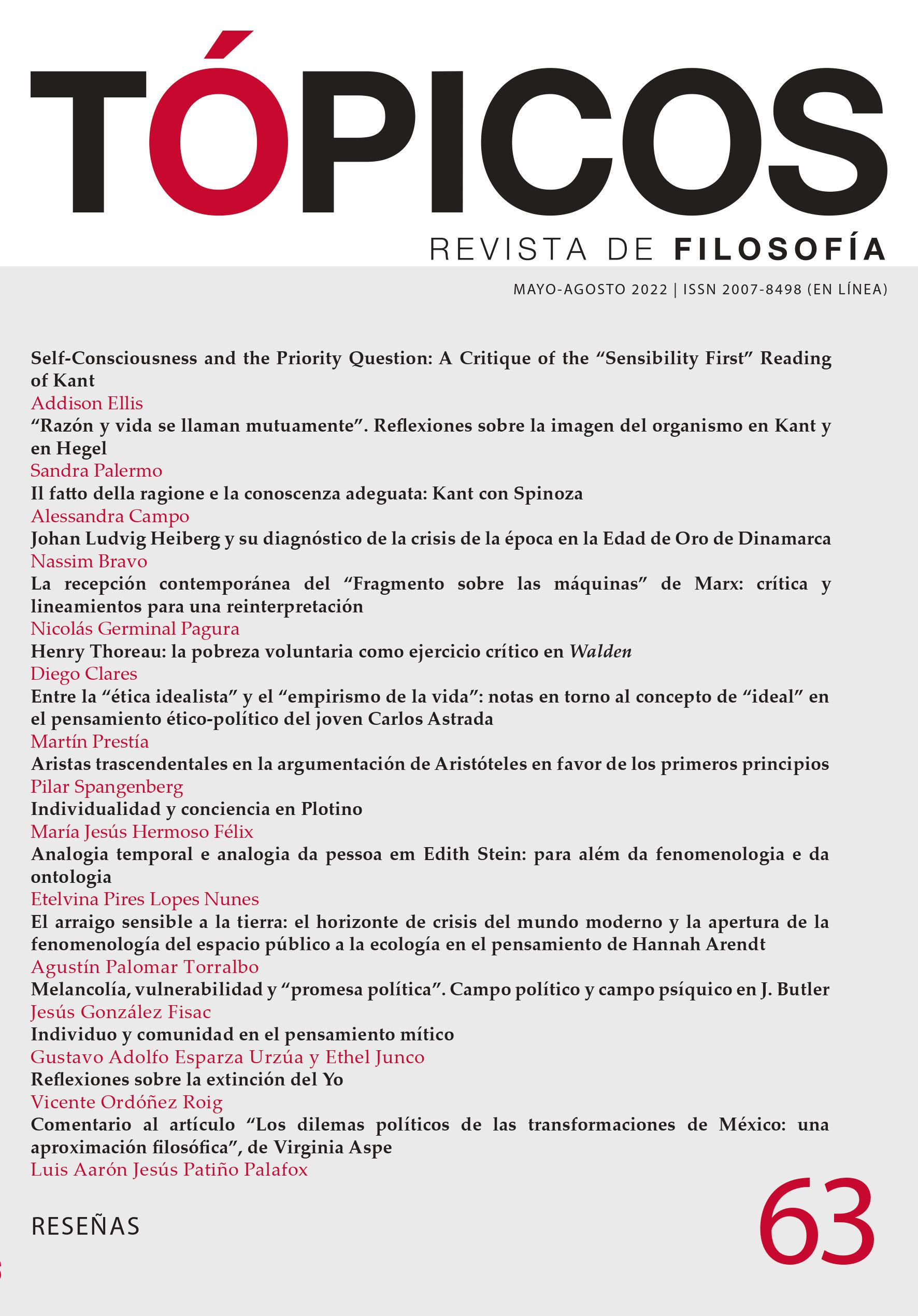Publicado 2022-04-18
Palabras clave
- Henry Thoreau,
- ética,
- lujo,
- pobreza,
- transcendentalismo
- Walden ...Más
Derechos de autor 2022 Tópicos, Revista de Filosofía

Esta obra está bajo una licencia internacional Creative Commons Atribución-NoComercial-SinDerivadas 4.0.
Cómo citar
Resumen
El propósito de este artículo es defender una triple propuesta dentro de la ética expuesta por Henry Thoreau en Walden: (1) la definición de su concepción del lujo, a la luz de cómo se ha abordado el tema desde diferentes posiciones históricas y relevantes para la filosofía; (2) la reivindicación de la pobreza como concepto fundamental para la propuesta ética de Walden y el sentido de la economía thoreauviana, y (3) la lectura de Walden como un texto estructurado que se conduce desde las condiciones individuales de la vida humana hasta las necesidades sociales y culturales. Estos tres puntos quedarán enlazados a través del ejercicio crítico de pobreza voluntaria practicado por Thoreau, en el sentido de una duda pragmática sobre los hábitos y en busca de lo necesario para la vida.
Referencias
- Aristóteles (1993). Ética nicomáquea. Ética eudemia. J. Pallí Bonet (trad.). Gredos.
- Bates, S. (2012). Thoreau and Emersonian Perfectionism. En R. A. Furtak, J. Ellsworth y J. D. Reid (eds.), Thoreau’s Importance for Philosophy. (pp. 14- 30). Fordham University Press.
- Cafaro, P. (2004). Thoreau’s Living Ethics. Walden and the Pursuit of Virtue. University of Georgia Press.
- Casado da Rocha, A. (2017). Una casa en Walden y otros ensayos sobre Thoreau y cultura contemporánea. Pepitas.
- Diógenes Laercio (2007). Vidas de los filósofos ilustres. C. García Gual. Alianza.
- Emerson, R. W. (1979). Nature. En The Collected Works of Ralph Waldo Emerson. Volumen I. (pp. 7-45). Belknap Press.
- Hoover, B. C. (2011). Comfort: An Atlas for the Body and Soul. Riverhead Books.
- Marx, K. (1983). Marx-Engels Gesamtausgabe (MEGA). II. Abteilung. Band 6. Das Kapital. Kritik der Politischen Ökonomie. Erster Band, Hamburg 1872. De Gruyter Akademie Forschung.
- Michaud, Y. (2015). El nuevo lujo. Experiencias, arrogancia, autenticidad. N. Petit Fontserè (trad.). Taurus.
- Moller, M. E. (1980). Thoreau in the Human Community. University of Massachusetts Press.
- Neufeldt, L. N. (1989). The Economist: Henry Thoreau and Enterprise. Oxford University Press.
- Real Academia Española. (2022). Lujo. En Diccionario de la Lengua Española. Versión 23.3 en línea. URL: https://dle.rae.es/?w=lujo.
- Robinson, D. (2004). Natural Life: Thoreau’s Worldly Transcendentalism. Cornell University Press.
- Sattelmeyer, R. (2000). Depopulation, Deforestation, and the Actual Walden Pond. En R. J. Schneider (ed.), Thoreau’s Sense of Place: Essays in American Environmental Writing. (pp. 235-243). University of Iowa Press.
- Sombart, W. (1958). Lujo y capitalismo. [Traductor no consignado]. Guillermo Dávalos.
- Thoreau, H. D. (2002a). Autumnal Tints. En L. Hyde (ed.), The Essays of Henry D. Thoreau. (pp. 217-242). North Point Press.
- Thoreau, H. D. (2002b). Life without Principle. En L. Hyde (ed.), The Essays of Henry D. Thoreau. (pp. 197-214). North Point Press.
- Thoreau, H. D. (2002c). Paradise (to be) Regained. En L. Hyde (ed.), The Essays of Henry D. Thoreau. (pp. 45-60). North Point Press.
- Thoreau, H. D. (2002d). Walking. En L. Hyde (ed.), The Essays of Henry D. Thoreau. (pp. 149-177). North Point Press.
- Thoreau, H. D. (2008). Walden. Oxford University Press.
- Turkle, S. (2015). Reclaiming Conversation: The Power of Talk in a Digital Age. Pinguin Press.
- Walls, L. D. (1995). Seeing New Worlds: Henry David Thoreau and Nineteenth-Century Natural Science. The University of Winsconsin Press.





